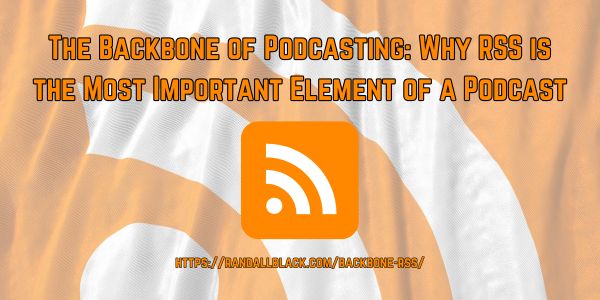Introduction
When it comes to podcasting, one technology remains at its core: RSS (Really Simple Syndication). While many platforms now offer podcast hosting and distribution, RSS remains the backbone of open podcasting. Without it, podcasting as we know it wouldn’t exist. This article explores what RSS is, how it powers podcast distribution, and why every podcaster should prioritize control over their feed.
What is RSS?
RSS is a web feed format that allows content to be syndicated automatically. In podcasting, an RSS feed is a structured file containing essential podcast information such as:
- Podcast title and description
- Episode metadata (title, duration, description, etc.)
- Audio file URLs
- Publishing date and category tags
Whenever you publish a new episode, your RSS feed updates automatically, notifying podcast directories and apps, which then distribute the new content to subscribers.
How RSS Powers Podcast Distribution
Every major podcast directory—Apple Podcasts, Spotify, Podcast Index, Pocket Casts, and more—relies on RSS feeds to fetch and distribute episodes. When a listener subscribes to a show, their app checks the RSS feed for updates, ensuring they receive new episodes as they are released.
Unlike social media platforms or proprietary hosting services, RSS keeps podcast distribution open and decentralized. Podcasters are not locked into a single company’s ecosystem, ensuring long-term accessibility for listeners.
Why RSS is Essential for Podcasters
Ownership & Control
With RSS, you own your podcast feed. If you rely on a closed platform, they control your audience and content. A platform can change policies, introduce paywalls, or even remove your show entirely. Owning your RSS feed means you are in control of distribution, branding, and monetization.
Monetization Freedom
Some hosting platforms impose limitations on monetization, forcing podcasters into revenue-sharing agreements. An independent RSS feed allows podcasters to choose their own monetization model, whether through ads, sponsorships, memberships, or value-for-value support models.
Longevity & Independence
Many proprietary platforms come and go, but RSS has remained a standard since the early days of podcasting. By maintaining your own feed, you ensure that your show remains accessible regardless of industry shifts.
The Role of Podcasting 2.0 in RSS Evolution
Podcasting 2.0 is an initiative that builds upon RSS by adding modern features while keeping podcasting open and decentralized. Some of the innovations include:
- Value-for-Value Payments – Direct listener support using Bitcoin/Lightning Network.
- Transcripts & Chapters – Enhanced metadata for accessibility and engagement.
- Episode Discovery & Tags – Improved categorization and searchability.
These updates maintain the integrity of RSS while pushing podcasting forward without corporate gatekeeping.
How PodPing is Changing Podcast Distribution
A major innovation in RSS-based podcasting is PodPing—a decentralized, blockchain-based notification system that enhances how quickly new episodes are discovered. Traditionally, podcast apps periodically poll RSS feeds to check for updates, which can cause delays in episode availability. PodPing solves this problem by utilizing the Hive blockchain to send instant notifications when a new episode is published.
Benefits of PodPing
- Faster Updates – Listeners receive new episodes almost instantly instead of waiting for polling intervals.
- Reduced Server Load – Podcast hosts no longer need to handle constant polling requests from multiple podcast directories.
- Decentralized Infrastructure – Unlike traditional proprietary notification systems, PodPing is open and resistant to censorship.
By integrating PodPing with RSS, podcasters ensure that their audience receives timely updates while reducing strain on hosting infrastructure. This technology is a significant step forward in making RSS-based podcasting more efficient and scalable.
Common Misconceptions About RSS
“RSS is Outdated”
Despite being an older technology, RSS remains crucial for podcast distribution. It provides a reliable, lightweight, and open way to syndicate content without being controlled by any single entity.
“You Need a Hosting Platform Like Spotify”
Many podcasters assume they must host their show on a closed platform like Spotify or Anchor. While these platforms offer convenience, they often restrict ownership and limit monetization options. Self-hosting or using open platforms that provide an RSS feed ensures greater flexibility.
“RSS is Too Technical”
Managing an RSS feed might seem complicated, but modern tools simplify the process. Services like Sovereign Feeds, The Split Kit, and podcast-friendly hosting providers make it easy to generate and manage RSS feeds without coding knowledge.
How to Set Up and Manage Your Own RSS Feed
Choosing a Podcast Host
Select a podcast host that gives you full control over your RSS feed. Some excellent options include:
- Buzzsprout – Simple interface with RSS customization.
- Captivate – Designed for growth-focused podcasters.
- Transistor – Independent hosting with analytics.
- Self-hosted Solutions – Using WordPress with plugins like PowerPress.
Using Tools Like The Split Kit & Sovereign Feeds
For podcasters who want full control over their RSS without relying on a hosting provider, The Split Kit and Sovereign Feeds offer robust solutions. These tools allow you to customize your feed, add podcasting 2.0 features, and distribute your show independently.
Best Practices for a Healthy RSS Feed
- Ensure your feed is valid using an RSS validator.
- Keep metadata and descriptions clear and concise.
- Regularly update artwork and categories to stay relevant.
- Monitor podcast directories for indexing issues.
Conclusion
RSS is the foundation of podcasting, ensuring open distribution, creator ownership, and long-term sustainability. While proprietary platforms offer convenience, they also come with limitations. By embracing RSS and maintaining control over your feed, you ensure that your podcast remains independent, accessible, and future-proof.
With innovations like Podcasting 2.0 and PodPing, RSS is becoming even more powerful, ensuring that podcasting remains an open and decentralized medium. If you’re a podcaster, don’t give up control—own your RSS feed and take charge of your podcast’s destiny!
